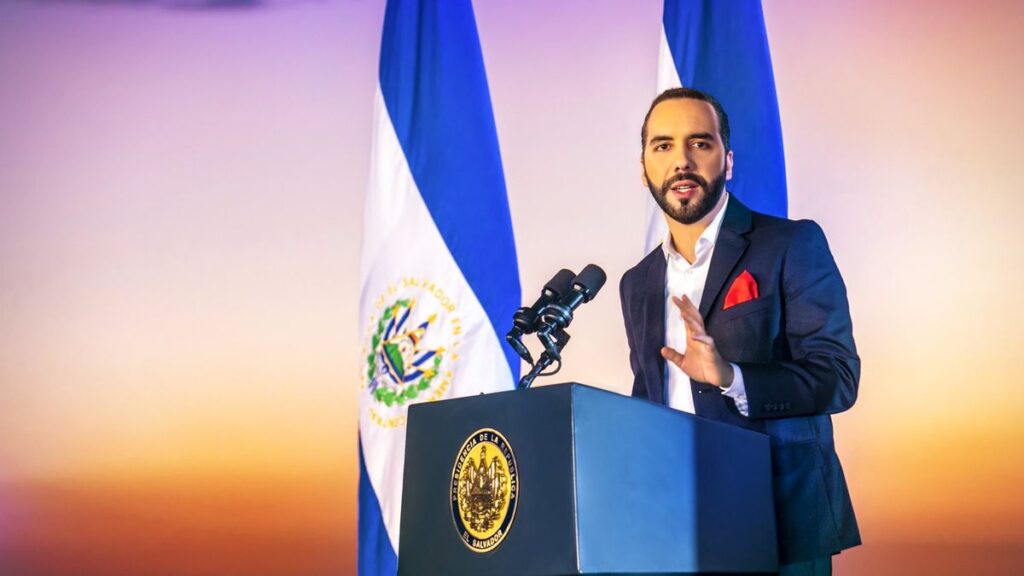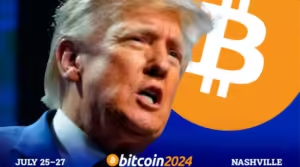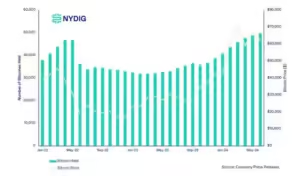El Salvador President Proposes Bitcoin Bank Amid Second Term

Quick Take:
- President: Nayib Bukele of El Salvador
- Proposal: Establishment of a private investment bank for Bitcoin
- Proposed By: Ambassador Milena Mayorga and Bitcoin adviser Max Keiser
- Timing: Two weeks after Bukele’s second-term inauguration
- Objective: Diversify financial services in Bitcoin and dollars
El Salvador’s President, Nayib Bukele, has unveiled a bold new initiative to further integrate Bitcoin into the country’s financial system. This move comes just two weeks after he was sworn in for his second term, following a decisive victory in the presidential election. The proposal, which has sparked significant interest and debate, aims to establish a private investment bank that would offer a wide range of services to Bitcoin investors, going beyond the capabilities of conventional banks.
The concept was introduced by Salvadoran Ambassador to the United States, Milena Mayorga, via a social media post. “As part of our economic plan for El Salvador, we propose a BPI, Bank for Private Investment, where we can diversify the financing options offered to potential investors in dollars and Bitcoin,” Mayorga announced on X, the social media platform formerly known as Twitter. This statement underscores the administration’s commitment to making El Salvador a global hub for Bitcoin and digital currencies.
Max Keiser, a senior Bitcoin adviser to President Bukele and a well-known advocate for cryptocurrency, also expressed his support for the proposal. He remarked, “President Bukele hits the ground running in new term with new legislation establishing a Bitcoin Bank.” Keiser’s enthusiasm highlights the administration’s determination to push forward with innovative financial reforms that capitalize on the growing global interest in cryptocurrencies.
This proposal is seen as the latest step in Bukele’s ambitious plan to transform El Salvador’s economy through Bitcoin. In 2021, El Salvador made history by becoming the first country to adopt Bitcoin as legal tender. While this groundbreaking decision garnered significant international attention and praise from the crypto community, it has not been without its challenges. The journey to integrate Bitcoin into the mainstream economy has faced hurdles, including fluctuations in Bitcoin’s value and skepticism from traditional financial institutions.
Despite these challenges, President Bukele’s administration remains steadfast in its commitment to Bitcoin. The proposed Bank for Private Investment (BPI) aims to offer a comprehensive suite of financial services to Bitcoin investors, including loans, investment opportunities, and other financial products that are typically not available through conventional banks. By doing so, the BPI hopes to attract more international investors and position El Salvador as a leading destination for Bitcoin investment.
The timing of this proposal is significant, coming shortly after Bukele’s re-election. His second term marks a continuation of his efforts to bring economic reforms and improvements to El Salvador. Bukele’s popularity has soared, largely due to his aggressive crackdown on the country’s notorious gangs, Mara Salvatrucha 13 and Barrio 18, which have terrorized the nation for decades. His administration’s hardline stance on crime has led to a dramatic decrease in the murder rate, earning him widespread acclaim both domestically and internationally.
El Salvador, once known as the “homicide capital of the world,” now boasts a murder rate comparable to that of Canada, according to recent government data. This remarkable turnaround in public safety has bolstered Bukele’s reputation and provided a stable foundation for his economic initiatives. By proposing the establishment of a Bitcoin bank, Bukele aims to build on this success and further stabilize and diversify El Salvador’s economy.
The proposed Bitcoin bank is expected to operate independently of traditional banking institutions, providing a unique and innovative approach to financial services. It will likely focus on leveraging blockchain technology to offer secure and efficient transactions, catering specifically to the needs of Bitcoin investors. This includes not only individual investors but also businesses and organizations that are increasingly looking to integrate Bitcoin into their operations.
One of the key benefits of the proposed Bitcoin bank is its potential to provide greater financial inclusion. In El Salvador, a significant portion of the population remains unbanked, with limited access to traditional banking services. By offering financial products and services in Bitcoin, the BPI could help bridge this gap and bring more people into the formal financial system. This aligns with Bukele’s broader vision of using technology and innovation to drive economic development and improve the quality of life for all Salvadorans.
However, the proposal is not without its critics. Skeptics argue that the volatility of Bitcoin could pose risks to the stability of the financial system and the broader economy. They also point to the potential for increased regulatory scrutiny and the challenges of ensuring security and preventing fraud in the rapidly evolving world of digital currencies. Addressing these concerns will be crucial for the success of the proposed Bitcoin bank.
As the proposal moves forward, it will likely undergo extensive discussions and revisions. The administration will need to work closely with both domestic and international stakeholders to develop a robust regulatory framework that ensures the bank’s stability and security while promoting innovation and growth. This will involve balancing the need for oversight with the flexibility required to adapt to the fast-changing landscape of cryptocurrency.
In conclusion, President Nayib Bukele’s proposal to establish a private investment bank for Bitcoin represents a significant and ambitious step in El Salvador’s ongoing efforts to integrate cryptocurrency into its economy. By offering a wider range of financial services to Bitcoin investors, the proposed Bank for Private Investment aims to attract international investment and promote financial inclusion. While the proposal faces challenges and skepticism, it also presents a unique opportunity to position El Salvador as a leader in the global Bitcoin community. As the nation continues to navigate the complexities of this new financial frontier, the world will be watching closely to see how this bold experiment unfolds.



